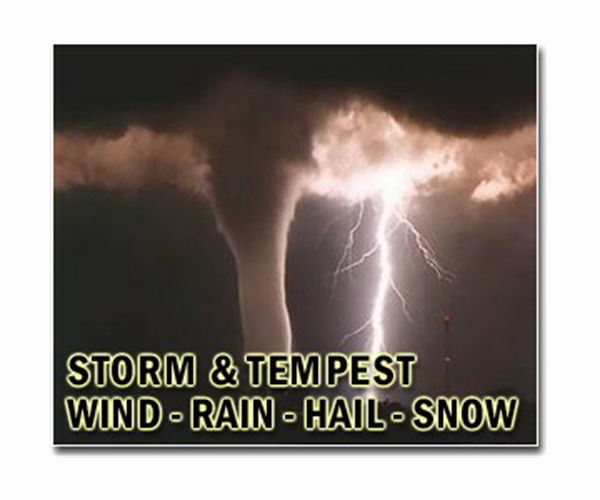At least 69 killed in thunderstorms, avalanches in India, Nepal, China
by AFP Staff Writers
Patna, India (AFP) April 12, 2025
At least 69 people were killed this week in unusually intense thunderstorms across eastern India’s Bihar state and in neighbouring Nepal, officials said Saturday.
While flash floods and lightning kill thousands of people each year, scientists warn that rising global temperatures are unleashing a cascade of extreme weather events.
Bihar disaster authorities said Saturday that at least 61 people had died in strong thunder and lightning storms on Thursday and Friday.
Eight more people were killed in neighbouring Nepal, disaster officials told AFP, blaming “lightning strikes” on Wednesday and Thursday.
Heavy rain is forecast to hit Bihar again on Saturday, according to the local India Meteorological Department office.
Last year, experts warned that climate change was fuelling an alarming increase in deadly lightning strikes in India, killing nearly 1,900 people a year in the world’s most populous country.
Lightning caused 101,309 deaths between 1967 and 2020, with a sharp increase between 2010 and 2020, a team of researchers led by Fakir Mohan University in the eastern state of Odisha said.
Warnings issued, flights cancelled as strong winds whip north China
Beijing (AFP) April 12, 2025 -
Residents in some areas were warned not to go outside as strong winds swept Beijing and parts of northern China on Saturday, causing hundreds of flights to be cancelled and rail services suspended, state media said.
The potentially record-breaking winds stemmed mainly from a “cold vortex system” that formed over Mongolia and was sweeping across northern China from Friday through the weekend, the China Meteorological Administration (CMA) said.
“The strongest winds are expected during the daytime of April 12, with wind speeds at some observation stations approaching or even surpassing historical records for the same period since 1951,” the CMA said in a statement.
It warned residents in those areas not to go outdoors “unless necessary”.
Beijing earlier issued its first orange alert — the second-highest tier — in a decade warning of strong winds this weekend.
As many as 699 flights had been cancelled at Beijing’s two airports by Saturday afternoon, state broadcaster CCTV said.
Train services, including on multiple high-speed rail lines, have also been suspended, it said.
Tourist attractions including the Summer Palace, Temple of Heaven, Beijing Zoo and the Universal Studios theme park were also closed temporarily.
Beijing authorities also postponed a half- marathon that was to have featured humanoid robot racers on Sunday.
Almost 300 trees in the capital had been toppled and 19 vehicles damaged, CCTV said, although no injuries due to the strong winds had yet been reported in Beijing.
China is the world’s biggest emitter of the greenhouse gases that scientists say are driving climate change and making extreme weather more frequent and intense.
Dozens of people were killed and thousands evacuated during storms that caused severe flooding around the country last year.
A highway in southern China collapsed in May after days of rain, killing 48 people.
Search called off for two Nepalis caught in Annapurna avalanche
Kathmandu (AFP) April 12, 2025 -
The search for two missing Nepali climbers has been called off, the expedition organiser said Saturday, five days after they were swept away by a powerful avalanche on Annapurna, the world’s 10th highest mountain.
The 8,091-metre (26,545-foot) Annapurna is a dangerous and difficult climb, and the avalanche-prone Himalayan peak has a higher death rate than Everest.
Two experienced mountain guides, Ngima Tashi Sherpa and Rima Rinje Sherpa, were ferrying oxygen cylinders for a later summit push when a huge avalanche swept down on Monday.
“The search has been called off. We tried to search for them from the ground and through aerial searches but could not find them,” Mingma Sherpa, chairman of the Seven Summit Treks expedition company, told AFP.
Two helicopters and five climbers were deployed in the operation.
“It is no longer possible for anyone to survive under such snow and ice, and continuing the search would endanger more lives,” Seven Summit Treks posted on Instagram late Friday, announcing the suspension.
“We have lost two of our finest guides.”
Nepal is home to eight of the world’s 10 highest peaks and welcomes hundreds of adventurers each spring, when temperatures are warm and winds are typically calm.
Nearly 500 climbers have been issued permits for the season, including 66 for Annapurna.
Avalanches and landslides are common in the upper reaches of the Himalayas, especially during the winter season.
Scientists have said that climate change spurred by humans burning fossil fuels is making weather events more severe, super-charged by warmer oceans.
Related Links
Weather News at TerraDaily.com

